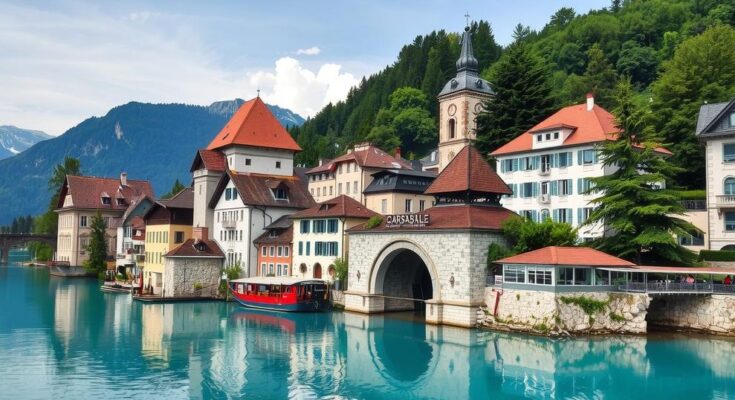Austria, known for its alpine beauty and cultural richness, is witnessing notable tourism growth driven by ninety-three countries benefiting from visa-free travel, including Chile, Brazil, Argentina, Canada, Mexico, and the United States. Despite a recent decline in tourist arrivals, Austria projects significant economic growth in 2024. The integrated efforts from top airlines and airports support connectivity and strengthen its global tourism presence, marking Austria as a premier travel destination with a mix of outdoor adventures and cultural sophistication.
Austria, located in south-central Europe, possesses stunning alpine environments, a rich cultural heritage, and a historical backdrop that continues to allure tourists globally. Recent findings highlight that nations such as Chile, Brazil, Argentina, Canada, Mexico, and the United States are part of ninety-three countries benefiting from visa-free travel, enhancing the attractiveness of Austria as a premier tourism destination. The nation harmoniously integrates its enduring traditions with modern diplomatic collaborations, maintaining its neutrality while actively participating in the European Union since 1995. Cities like Vienna and Salzburg epitomize Austria’s cultural wealth and picturesque landscapes, solidifying its reputation as a focal point for cultural and political tourism.
In September 2024, Austria observed a decline of 9.9 percent in international tourist arrivals, totaling approximately 2.5 million visitors, a decrease from 2.8 million in the previous year. This shift presents challenges for the tourism sector, renowned for its exquisite alpine scenery and historical landmarks. To counteract this decline, targeted strategies to elevate visitor numbers and sustain Austria’s allure as a top tourism spot are now crucial.
In the context of economic growth, Austria is projected to showcase strong performance in 2024, with a nominal GDP estimated at $535 billion. The purchasing power parity (PPP) for the same year is anticipated to reach $667 billion, underscoring the country’s economic stability and high-standard living, with GDP per capita estimated at $58,668.6. These robust economic indicators will reinforce Austria’s pivotal role in the global economy as it advances into 2024.
As a well-connected hub in Europe, Austria is served by numerous airlines, including its flagship carrier, Austrian Airlines, which operates a comprehensive network of domestic and intercontinental routes. Other notable airlines such as Ryanair, Wizz Air, Lufthansa, and EasyJet facilitate affordable travel options across Austria, attracting budget-conscious travelers and ensuring smooth connections to major global destinations.
Austria features top airports that underscore its connectivity, accommodating millions of travelers. These airports are essential in supporting Austria’s thriving tourism and business sectors.
Renowned for its outdoor adventures and cultural richness, Austria offers breathtaking alpine landscapes perfect for skiing and hiking, alongside sophisticated urban experiences. Cities like Vienna enchant visitors with their majestic palaces, world-renowned museums, and a vibrant music scene linked to historical figures like Mozart and Strauss.
Among Austria’s iconic cultural landmarks are Stift Melk and Schloss Ambras, both reflecting the nation’s historical and artistic richness. Stift Melk is celebrated for its baroque architecture and intricate interior, while Schloss Ambras, a Renaissance treasure, showcases impressive collections of art and weaponry. Additionally, the Vienna Staatsoper stands as a cultural epicenter for opera and ballet, offering guided tours that reveal its historical and architectural significance, making it a cultural staple for visitors.
Austria also hosts grand hotels that complement its cultural heritage and stunning landscapes, providing luxurious accommodations that enrich any visit.
The vibrant cultural events celebrated across Austria add to its appeal, inviting visitors to immerse themselves in local traditions and experiences.
Austria’s central European location and its reputation for cultural depth and natural beauty serve as significant catalysts for tourism. The country’s engagement in global tourism is enhanced through visa-free travel agreements with several countries, thus impacting visitor numbers and shaping travel trends. With a rich economic outlook and a well-developed travel infrastructure supported by major airlines and airports, Austria remains a crucial player in the global tourism and economic landscape. The historical richness of Austrian cities, combined with picturesque outdoor settings, makes the country an irresistible destination for travelers worldwide. Understanding these factors is essential in comprehending how Austria continues to attract a diverse range of international visitors, despite current challenges in tourist numbers.
In conclusion, Austria’s allure as a tourism destination is underscored by its stunning landscapes, rich cultural heritage, and strategic engagement in global travel trends through its visa-free access for several nations. Despite facing recent declines in visitor numbers, Austria’s economic stability and robust airline connectivity will be instrumental in revitalizing its tourism industry. As a unique blend of historical and modern experiences, Austria not only captivates visitors but also retains its status as a significant cultural and political hub in Europe, ensuring it remains a top destination for global travelers.
Original Source: www.travelandtourworld.com




